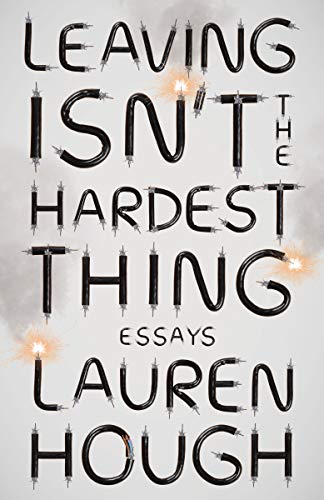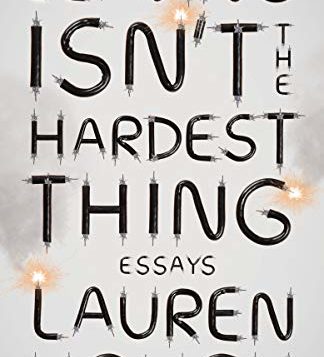 LEAVING ISN’T THE HARDEST THING
LEAVING ISN’T THE HARDEST THING
Essays
by Lauren Hough
Vintage. 320 pages, $16.95
LEAVING Isn’t the Hardest Thing is a memoir that hasn’t got a tidy chronology or a crystal-clear resolution, and its language is often coarse. Yet Lauren Hough’s vivid, darkly humorous essays paint a fresh and powerful picture of two intertwined struggles. The first is essentially the author’s coming-out story; the second is her ongoing effort to break the hold of a corrosive secret: the childhood she spent inside a “textbook abusive” religious cult.
Hough lives in Austin, Texas, and this is her first book. The eleven essays begin with her resignation from the U.S. Air Force at the age of 23 and go on to narrate later episodes that trigger flashbacks to her days in the cult. The writer has called the essays “reckoning[s]of survival, identity, and how to reclaim one’s past when carving out a future.” Born in Berlin in 1977, Hough is the third child of a Texan couple who, while still in their teens, had joined the notorious Children of God cult founded by Californian David Berg back in the Vietnam War era. “Forsake all and follow Jesus” was Berg’s call to his followers. Reorganized as The Family of Love (or The Family), the cult had more than 130 communes worldwide at the time of Hough’s birth. The author lived with the cult in Europe, South America, and Japan, and except for three years after her parents’ divorce, was in the cult until age fifteen.
Cult-appointed “shepherds” maintained order with browbeating or physical beatings. Rules required that girls dress and behave in ways that were attractive to men, and Hough, a freewheeling, rangy tomboy, became a target. When another child, Ruthie, was found in Hough’s bunkbed with her, for example, Hough was summoned for questioning. The girls had been listening to music, sharing earpieces of a radio that Hough had taken from a pile of common goods and hidden in a pocket she cut into the foam mattress. During an hours-long interrogation, the writer admitted to small infractions but never pledged to comply with the rules. In the title essay she reflects on the episode: “I’m proud I resisted. I’m proud I smuggled a radio into my room. … I’m proud that I was a stubborn, defiant little lesbian who made them work so hard to break me.”
Growing up in an abusive cult would make it harder than usual for Hough to live an openly lesbian adult life. The essay “Solitaire” describes her response to hostility in the Air Force and links it with her cult experience. Hough enlisted at the age of eighteen and was sent to Shaw Air Force Base in South Carolina. “Don’t Ask, Don’t Tell” was in force (1994–2011), and while she was out to family and a few friends, the airman was not out officially. While on a mission in Egypt, she found the words “Die Dyke” written in dust on her rental car, but she said nothing. After returning home, she found her car with four flat tires, then a series of notes tucked under the windshield warning she would “burn,” or maybe be killed. “Gun knife or bat I can’t decide which,” read one message. While babysitting her commanding officer’s children one night, she glanced outside to see her car, parked in the driveway, ablaze.
This time, she reports the incident. An investigation is launched, but circumstantial evidence and false testimony by squadron mates lead—incredibly—to Hough’s court martial on the charge of “arson with intent to defraud.” With the help of an outside lawyer she is found not guilty and entitled to honorable discharge, which she opts for. Replying to her commander’s request for a “Don’t Ask” declaration, she simply writes: “I’m gay. Please process my discharge.” “Homosexual admission” is stamped across her papers, and she is given 48 hours to leave. “All I’d done was join another cult,” Hough realizes.
“The Slide” and “Badlands” graphically depict the airman’s arduous re-entry into civilian life. She and another jobless veteran, also gay, head to Washington, D.C. where they find work bartending at a popular gay club. With her six-foot height, crewcut, and military bearing, Hough works hours as a bouncer too. For a while, the pals sleep in a rental car and fill up on free snacks at the bar. During this dismal stretch, the author relies on alcohol as well as drugs (a perk of club work) to keep exhaustion and anxiety at bay.
Hough wants to date but is socially awkward. Eventually she meets and moves in with Rhonda. The relationship wears thin, but for two years she can’t find the confidence to walk out. However, she does find humor in her plight. “How to Make an Enemy” tells how an enraged Rhonda emails her ex-girlfriend itemized bills for all the dinners, vacation trips, and gifts she had bought. Hough gamely reciprocates, emailing back invoices for every “sexual service” she had provided. “Turned out she owed me,” Hough notes. “Never heard from her again,”
“Cable Guy” is likewise incisive. The essay is based on Hough’s decade of work as a cable tech making house calls in the Virginia suburbs, which gave her opportunities to view “the American id in its underpants.” Her takes on customers are wildly funny, and the essay went viral on the Internet. No one escapes skewering, including occupants of two political households—Mary Cheney and her father Dick.
By her mid-thirties Hough is modestly successful and lives in the suburbs. But after breaking up with a third girlfriend, depression hits, shocking her into the project of reclaiming her lost childhood. “Everything That’s Beautiful Breaks My Heart” describes her efforts, starting with the potent memory of her family’s nighttime departure from a cult home in Germany in 1992, followed by their flight back to Texas. Hough recalls that when founder Berg died later that year, her mother asked her to keep their cult experience secret, and she had agreed. Twenty years later, it was time to rethink.
She begins by posting on message boards to find “cult babies” who may have lived with her. Buoyed by their responses, she starts exchanging stories with former cult-mates. She travels to Germany to see the flat where she was born. She unearths cult literature at the Texas site where her parents had joined, elated to discover propaganda comics that look familiar. Amazingly, she finds Ruthie, happy to confirm that they both survived. As Hough verifies her childhood experience, the cult’s hold loosens. She even finds herself in agreement with a cult claim: “American promises are lies for most people.” Movingly, she empathizes with her parents, the nineteen-year-olds who had signed on with The Family in hopes of a peaceful life. Leaving lays out the heavy consequences this decision held for their youngest daughter. At the same time, this boisterous, wide-ranging memoir reveals her clear-eyed, non-self-pitying spirit.
Rosemary Booth is a writer and photographer living in Cambridge, Mass.






